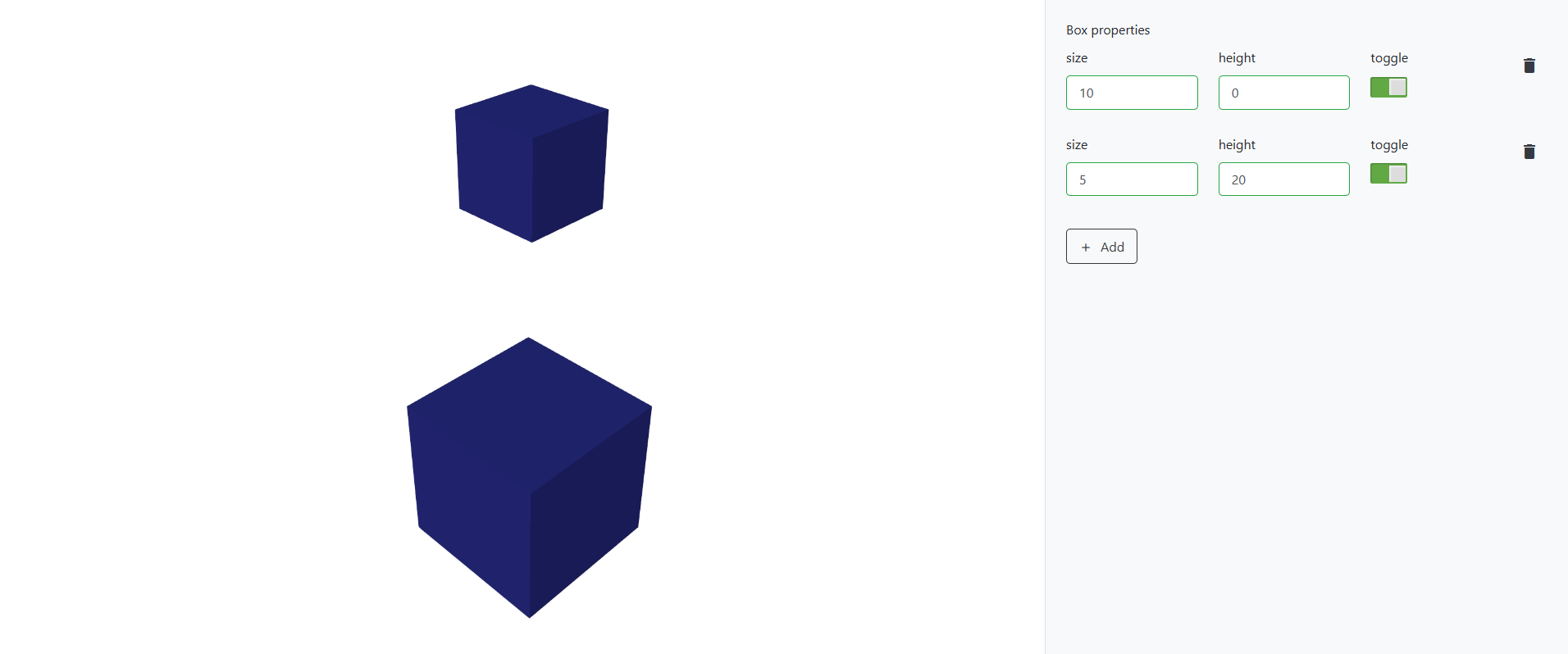How to add n amount of inputs
Introduction
Would you like to generate a parametric number of geometries with different values based on user inputs? Then add n amount of inputs by following these steps.
Prerequisites
- You have a working project with at least one
ControlPanelconnected to a Grasshopper model.
1. Add an array control
To have multiple rows of inputs, configure a control with kind: Array in your control panel.
- Define the
controlin the array withkind: Group. This group can be repeated n times in the user interface depending on the user inputs. - Define the
controlsin the group. - Optionally define a
labelfor your array control. - Optionally define the
layoutof the group.
The configuration should look similar to the example below:
my-control-panel:
kind: ControlPanel
controls:
box-properties:
kind: Array
label: Box properties
control:
kind: Group
controls:
size:
kind: NumberInput
label: Box size
height:
kind: NumberInput
label: Box elevation
toggle:
kind: Toggle
label: Box toggle
value: true
2. Subscribe your model to the ControlPanel
To run the Model with the values from the ControlPanel:
- Subscribe the
Modelto theControlPanel. - Define the
frameandsource.
my-model:
kind: model
modelFile: my-grasshopper-file.gh
subscribe:kind: ControlPanel
source: my-control-panel
frame: home-frame
3. Retrieve values from the array in Grasshopper
When the Model subscribes to a ControlPanel with an array, the array control returns inputs in a JSON format. In the example below there are two groups with different height, size and toggle values.
{
"height": 5,
"size": 10,
"toggle": true
},
{
"height": 15,
"size": 25,
"toggle": false
},
...
To run a Grasshopper definition with n number of inputs, prepare the definition to retrieve values from the array.
- Add a Packhunt
Inputcomponent with the same name as yourArraycontrol. - Use the Packunt
Item From Jsoncomponent to retrive the values for the controls in the array group. - Use the resulting values in your Grasshopper logic.
💡To test locally, you can add the JSON in a panel and use the JSON From Text and Unpack JSON List components before the Input component as shown in the example below.
The configuration should look similar to the example below:
See the image below as an example.

4. (Optional) Save the array value in an EntityDataStore
To store the array value(s) in the EntityDataStore:
- Define the property with
type: Arrayin the EntityDataStoreproperties. - Define the
itemsin the array withtype: Object. - Define the
propertiesof theObject.- Configure each property with the control names in the ControlPanel array group.
- Define the
typeof the property.
- Define the
defaultvalues of the object.
The configuration should look similar to the example below:
my-entity-datastore:
kind: EntityDataStore
properties:
box-properties:
type: Array
items:
type: Object
properties:
height:
type: Number
size:
type: Number
toggle:
type: Boolean
default:
height: 10
size: 5
toggle: true
💡You can subscribe your Model to the EntityDataStore to run it with the entity values.
See the image below as an example.

Configuration
See the ControlPanel array configuration docs for more information.